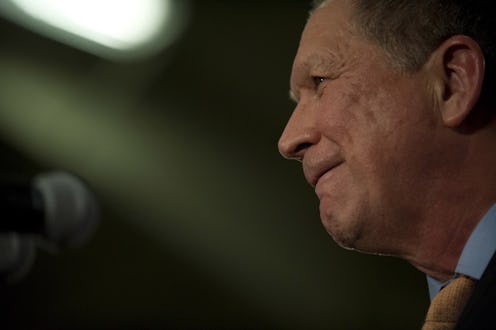News
What A Contested Convention Would Look Like
The prospect of a contested convention has cast a shadow over the Republican primary for months now. The heavily fractured GOP field has split the vote in almost every contest, making it a very real possibility that no one candidate will win the 1,237 delegates required to win the nomination outright. If nobody hits that magic number, it's contested convention time. But exactly what happens at a contested convention, and how does it play out?
Before we tackle that question, let's first look at what happens when there isn't a contested convention. In most primaries, one candidate or another wins the majority of delegates in the caucuses and primaries. At the convention, the total pool of delegates meets on the floor and votes on who the party should nominate for president. But the outcome of this vote is really a foregone conclusion — whichever candidate won the majority of delegates through the primary and caucus process will win the vote and become the nominee.
That's what it looks like in normal election cycles. But of course, this election cycle is not the slightest bit normal.
At a contested convention, all of the delegates meet on the floor to vote on a nominee, but because nobody won a majority of the delegates, the vote won't produce a winner. One candidate will win a plurality of the votes, but that's not enough to get the nomination under GOP party rules (or Democratic rules, for that matter), and so the result will be inconclusive.
And this is where things get interesting. After the first round of voting (also called the first ballot) fails, a whole bunch of delegates will become unbound, meaning they can vote for whoever they want. If and when a specific delegate becomes unbound varies from state to state; most will be freed up after the first round of voting, and about 75 percent of all delegates will become unbound if subsequent votes don't produce a nominee.
But we're getting ahead of ourselves. If the first ballot fails and a bunch of delegates become unbound, the candidates and their campaigns will frantically try to convince those delegates to side with them. This "convincing" can look an awful lot like bribery, because as Sasha Issenberg points out for Bloomberg, there's nothing in RNC rules that prohibits candidates from explicitly cutting deals with delegates in exchange for their votes.
The nature of these possible deals will differ from delegate to delegate. For example, if a delegate is a sitting member of Congress, Ted Cruz could offer them an appointment at a state agency if they switch their vote to Cruz. To lure a delegate who's also a governor, Donald Trump could offer them a cabinet appointment. Issenberg claims that this is all technically legal. Of course, these offers will only come to fruition if the candidate in question both wins the nomination and wins the presidency. Meanwhile, delegates who aren't elected officials may simply be offered compensation for their airfare and hotel bills, which they normally pay for themselves, according to Bloomberg.
In any event, after the wheeling and dealing, a second round of voting will be held. If a candidate ends up winning a majority of delegates this time around, they're the nominee. If they don't, it's back to the dealmaking. Lather, rinse, repeat, until one candidate finally wins a majority and becomes the nominee. There's no limit to how many rounds of voting can be held — the 1924 Democratic convention was contested, and it took 102 ballots before a nominee was selected.
It’s far too soon to say who will triumph if the 2016 Republican convention is contested, but one thing is fairly certain: It’ll be a blast to watch.
